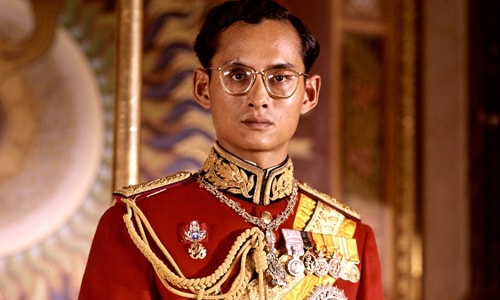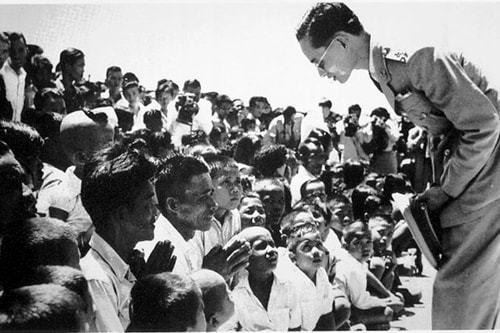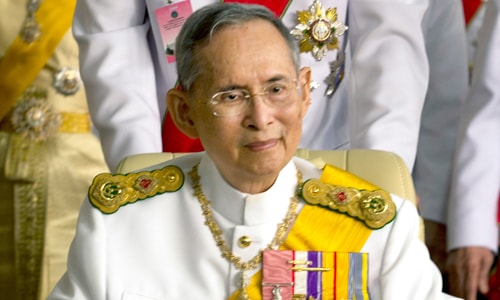Why is the King of Thailand so loved by the people?
King Bhumibol's tireless efforts for the people's lives were rewarded with the love of the entire nation.
 |
| King Bhumibol Adulyadej in 1950. Photo: CNN |
The Thai people have just lost their most respected and beloved icon, King Bhumibol Adulyadej, the world's longest-reigning monarch, who passed away on October 13 at the age of 88.
The Bangkok Post called the moment King Bhumibol took his last breath "the scariest moment" for all Thai people, a moment they did not want but eventually had to face.
Millions of Thai people cried when they heard the news of the King's death, because to them, this respected king was considered a symbol of national unity and solidarity, a pillar of the country's stability during his 70-year reign.
During those seven decades, Thai people from all walks of life witnessed him tirelessly dedicating his time, effort, and money to helping people across the country. They felt grateful that whenever the country was in a difficult situation, the King would step in to resolve seemingly insoluble disagreements, lead people out of deadlocks, and unite them into a bloc.
Through the turbulent and rapidly changing times of history, King Bhumibol has become an example of justice, a testament to love amidst social conflicts and human moral degradation. Newspapers in Thailand yesterday and today all switched to black and white to commemorate the king, and to remember an important period where the image of King Bhumibol always reigned in the hearts of the people of this country.
King of the people
Singapore's Straits Times newspaper called King Bhumibol "the people's king" in an article recalling his reign. According to the article, it was King Bhumibol's tireless efforts and dedication that earned him that title.
When he returned to Thailand from the United States in 1946 to take over the throne, he spent a lot of time traveling around the country, making close contact with all classes of people. In his Land Rover, he and his engineers, doctors, and agricultural scientists traveled more than 50,000 km each year, to the most remote areas of the country. On each trip, he and the Queen distributed tens of thousands of blankets, clothes, and school uniforms to disadvantaged areas.
The young king was always interested in science, technology and the environment, even cloud seeding technology to create artificial rain for farmers. He often appeared in photos looking busy, with a pocket camera hanging around his neck.
In his office in Bangkok, the king often pored over drawings, designed irrigation systems, and communicated with government officials via a radio.
With his tireless efforts, King Bhumibol quickly won the hearts of the people and exerted great influence on other political classes in society, even though his throne was only symbolic and held no real power in Thailand.
 |
| King Bhumibol during a visit to the people. Photo: People |
In his 2006 book "The King Who Never Smiles," Paul Handley argues that King Bhumibol restored the reputation of the Thai royal family to the point where they were seen as "the most powerful political force" in the country.
And with that "power of the people", King Bhumibol repeatedly rescued the Thai people from chaos and bloodshed, especially during coups carried out by the military.
In 1973, when students took to the streets to protest the regime of military dictator Thanom Kittikachorn, the King ordered the doors of Chitralada Palace in Bangkok to be opened to the persecuted students. He then appeared on television to announce that the dictator had resigned, ending the Thanom regime.
By 1992, the Thai army, under the command of coup leader Suchinda Kraprayoon, continued to suppress and kill protesters led by retired General Chamlong Srimuang. King Bhumibol summoned both men to the palace. Television footage of the two generals kneeling at the king's feet shocked Thailand, and the violence ended with the King's admonition: "The country does not belong to one or two people, it belongs to the people. Those who oppose each other will fail, and the ultimate loser is the country."
That image further strengthened the king's "moral authority" in the hearts of the people, and the image of the King shone even brighter as an exemplary husband and father, without any rumors or scandals.
 |
| King Bhumibol is deeply loved by the Thai people. Photo: People |
"The monarchy is the soul of the Thai people," former Prime Minister Kukrit Pramoj declared in a 1979 BBC interview.
"Thai people have a very high sense of unity, and the King is considered the leader of the whole nation, the father of a large Thai family. All good things in Thai culture come from the King. The King's character, lifestyle, way of thinking and ideology are considered the quintessence of the nation. Even Buddhism is considered by us to come from the King and the Royal Family," said Mr. Kukrit.
According to VNE
| RELATED NEWS |
|---|

